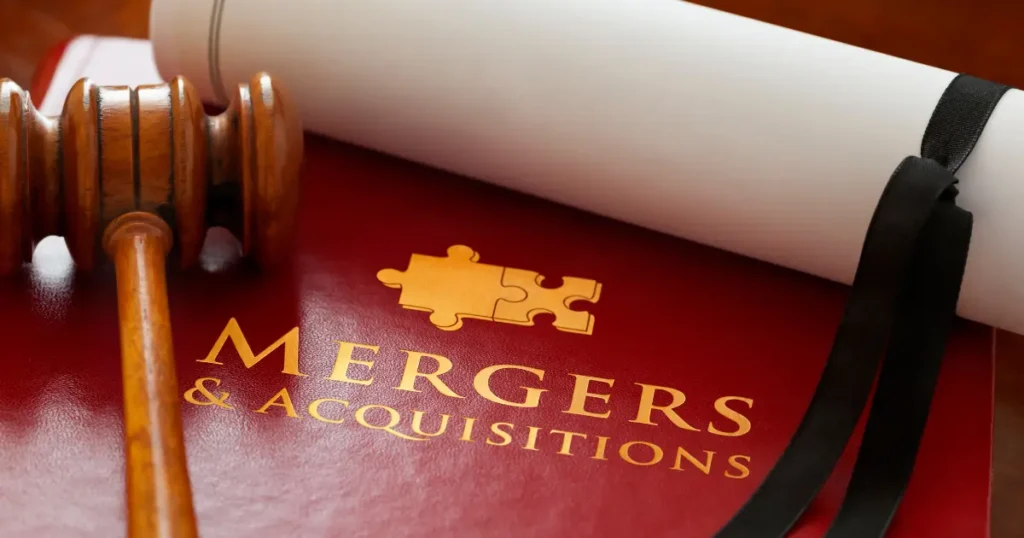Best Practices for Legal Success in Mergers and Acquisitions in Saudi Arabia 2025
Mergers and acquisitions (M&A) refer to the process of consolidating companies or assets through various financial transactions. These transactions can include mergers, where two companies combine to form a single entity, or acquisitions, where one company takes over another. The primary goal of mergers and acquisitions is to achieve strategic business objectives such as expanding market share, acquiring new technologies, or entering new markets.
However, the complexity of M&A transactions demands a comprehensive understanding of both business and legal considerations. Without a proper legal framework, even the most promising mergers and acquisitions can face unforeseen challenges, including regulatory roadblocks, contract disputes, and tax complications.
Understanding legal tips for mergers and acquisitions is vital for mitigating risks and ensuring a smooth transition. Whether you’re a buyer, seller, or stakeholder, having a reliable legal strategy in place is essential to navigating the intricate process of mergers and acquisitions effectively.
Importance of Legal Due Diligence
Legal due diligence is a critical step in mergers and acquisitions, ensuring that both parties have a complete understanding of the transaction’s legal, financial, and operational implications. It involves a thorough investigation of the target company’s records, contracts, compliance status, and liabilities to uncover any potential risks. Here’s why it matters:

1. Identifying Legal Risks
Legal due diligence helps identify risks that could impact the success of the transaction. This includes unresolved litigation, regulatory non-compliance, and undisclosed liabilities. Early detection allows for effective mitigation strategies.
2. Ensuring Regulatory Compliance
Every industry operates within a framework of regulations that must be adhered to during a merger or acquisition. Due diligence ensures that the target company complies with local, national, and international laws, avoiding penalties or delays.
3. Verifying Asset Ownership
Ownership of key assets, such as intellectual property, real estate, and equipment, is verified during due diligence. This ensures that the buyer gains rightful ownership post-transaction, avoiding future disputes.
4. Reviewing Contracts and Obligations
Due diligence involves examining contracts with suppliers, clients, and employees to identify clauses that could impact the transaction, such as termination penalties or change-of-control provisions.
5. Financial and Tax Implications
Legal due diligence reviews financial records to identify tax obligations, outstanding debts, and other financial commitments that may influence the transaction’s value.
By conducting thorough legal due diligence, both buyers and sellers can ensure transparency, build trust, and reduce the likelihood of post-merger disputes. For expert guidance in mergers and acquisitions, consulting an experienced law firm like Dr Abdulrahman Baamir Law Firm can make all the difference in achieving a successful transaction.
Common Pitfalls in Mergers and Acquisitions
Mergers and acquisitions (M&A) can unlock immense opportunities for growth and innovation, but they are not without risks. Many transactions fail or face significant setbacks due to avoidable pitfalls. Below are some of the most common challenges encountered during M&A processes:

1. Inadequate Due Diligence
Skipping or conducting superficial due diligence can result in overlooking critical issues, such as undisclosed liabilities, regulatory violations, or flawed financial records. These oversights can lead to costly consequences after the deal is closed.
2. Misalignment of Goals
When the merging entities have conflicting objectives or cultural differences, it can lead to integration challenges. Misaligned goals between stakeholders may also result in disputes or loss of key personnel.
3. Regulatory Hurdles
Failing to comply with regulatory requirements can delay or even derail the transaction. Antitrust issues, licensing problems, or non-compliance with local laws are common barriers in cross-border deals.
4. Poor Valuation and Overpayment
Overestimating the value of the target company or agreeing to an inflated purchase price can lead to financial strain. Misjudged valuations often arise from insufficient market analysis or incomplete data.
5. Neglecting Integration Planning
A lack of a robust post-merger integration plan can result in operational inefficiencies, reduced productivity, and loss of market share. Integration challenges often stem from differences in organizational structures or technological systems.
6. Employee and Stakeholder Resistance
Resistance from employees or stakeholders is another common pitfall. Poor communication about the merger or acquisition can create uncertainty, leading to reduced morale and retention issues.
7. Failure to Protect Confidential Information
Sensitive information exchanged during negotiations must be protected. Leaks or mishandling of confidential data can damage reputations and jeopardize the transaction.
8. Ignoring Tax Implications
Overlooking tax considerations, such as transfer pricing or capital gains taxes, can result in unexpected financial burdens post-transaction.
Avoiding these common pitfalls requires expertise, careful planning, and thorough execution. Engaging a trusted legal partner like Dr Abdulrahman Baamir Law Firm ensures that potential risks are identified and mitigated, paving the way for a seamless and successful M&A process.
Best Practices for Legal Success in Mergers and Acquisitions
Ensuring the success of mergers and acquisitions (M&A) requires a combination of thorough preparation, expert legal oversight, and proactive strategies. Below are some of the best practices for achieving legal success in M&A transactions:

1. Conduct Comprehensive Due Diligence
Thorough legal, financial, and operational due diligence is essential to uncover potential risks. Investigate all aspects of the target company, including contracts, liabilities, intellectual property, and regulatory compliance. This will help in making informed decisions and negotiating favorable terms.
2. Negotiate Clear and Precise Agreements
Drafting clear and detailed contracts is crucial to avoid ambiguity. Clearly outline the rights, obligations, and responsibilities of all parties involved. Pay special attention to non-compete clauses, warranties, indemnities, and termination provisions.
3. Ensure Regulatory Compliance
Verify that both companies adhere to all applicable laws and regulations. This includes antitrust laws, industry-specific guidelines, and cross-border legal requirements for international deals. Failing to comply can lead to fines or the invalidation of the transaction.
4. Protect Intellectual Property
Secure ownership and usage rights for the intellectual property (IP) of the target company. Ensure that trademarks, copyrights, patents, and trade secrets are legally transferred to the acquiring entity without any encumbrances.
5. Develop a Robust Integration Plan
Plan for post-transaction integration early in the process. Address potential challenges, such as cultural differences, organizational structures, and technological systems. A detailed integration plan helps ensure a smooth transition and maximizes value.
6. Safeguard Confidential Information
Implement strict confidentiality agreements to protect sensitive information during negotiations. Ensure that all parties involved adhere to data protection regulations to avoid leaks that could harm the transaction or business reputation.
7. Prioritize Employee and Stakeholder Communication
Maintain open and transparent communication with employees, stakeholders, and other relevant parties throughout the M&A process. Address their concerns and provide clarity to reduce resistance and ensure their support.
8. Work with Experienced Legal Advisors
Engage a law firm with expertise in mergers and acquisitions to guide you through the process. A legal advisor can help identify potential risks, negotiate favorable terms, and ensure compliance with all applicable laws.
By following these best practices, businesses can reduce risks, streamline the M&A process, and achieve their strategic objectives effectively. For expert legal assistance tailored to your specific needs, consult Dr Abdulrahman Baamir Law Firm, where our team specializes in ensuring the success of mergers and acquisitions through meticulous planning and execution.
Role of a Law Firm in Mergers and Acquisitions
The involvement of an experienced law firm is crucial in ensuring the success of mergers and acquisitions (M&A). A law firm provides essential guidance and expertise at every stage of the transaction, safeguarding the interests of all parties and minimizing risks. Below are the key roles a law firm plays in M&A:

1. Conducting Legal Due Diligence
Law firms perform comprehensive due diligence to identify potential legal, financial, and operational risks. They assess contracts, liabilities, intellectual property rights, and regulatory compliance to ensure the transaction proceeds smoothly.
2. Drafting and Reviewing Agreements
One of the most critical roles of a law firm is to draft, review, and negotiate contracts. This includes the sale and purchase agreement (SPA), non-disclosure agreements (NDAs), and employment contracts. The goal is to ensure clarity, fairness, and legal soundness in all documentation.
3. Ensuring Regulatory Compliance
Law firms ensure that the M&A transaction complies with local, national, and international laws. They help navigate antitrust regulations, licensing requirements, and other legal obligations, minimizing the risk of penalties or deal disruptions.
4. Handling Dispute Resolution
In case of disputes during negotiations or post-transaction, a law firm provides mediation and arbitration services. Their expertise helps resolve conflicts efficiently without escalating them into costly litigation.
5. Structuring the Deal
Lawyers help structure the transaction to align with the client’s strategic objectives. They advise on deal types (e.g., asset purchase vs. share purchase) and payment structures, ensuring tax efficiency and compliance with legal frameworks.
6. Safeguarding Confidentiality
A law firm ensures that sensitive information is protected through confidentiality agreements. They also oversee data sharing protocols during due diligence to prevent leaks or misuse.
7. Facilitating Smooth Integration
Post-merger, law firms assist with legal aspects of integrating the two entities, including transferring licenses, renegotiating contracts, and addressing employment law issues.
8. Providing Strategic Advice
Beyond legal expertise, law firms often provide strategic counsel to help clients make informed decisions. They offer insights on market conditions, potential risks, and negotiation tactics.
Why Choose Dr Abdulrahman Baamir Law Firm?
Dr Abdulrahman Baamir Law Firm specializes in mergers and acquisitions, offering tailored legal solutions to ensure your transaction is seamless and successful. With our deep understanding of regulatory frameworks and commitment to protecting your interests, we provide the expertise you need to navigate the complexities of M&A confidently.
Whether you’re looking to merge with another company or acquire a new business, trust Dr Abdulrahman Baamir Law Firm for comprehensive legal support every step of the way.
Conclusion
Mergers and acquisitions present exciting opportunities for growth, innovation, and market expansion, but they also come with complex legal and operational challenges. From conducting thorough due diligence to navigating regulatory compliance, every step of the process requires meticulous attention to detail. By understanding and addressing common pitfalls and adhering to best practices, businesses can mitigate risks and set the stage for a successful transaction.
Partnering with a trusted legal advisor is key to ensuring the success of your M&A journey. Dr Abdulrahman Baamir Law Firm offers unparalleled expertise and personalized legal solutions tailored to your needs. With a proven track record in handling complex mergers and acquisitions, we help our clients navigate the intricacies of these transactions confidently and efficiently. Trust our team to protect your interests, provide strategic counsel, and ensure a seamless M&A process from start to finish.
